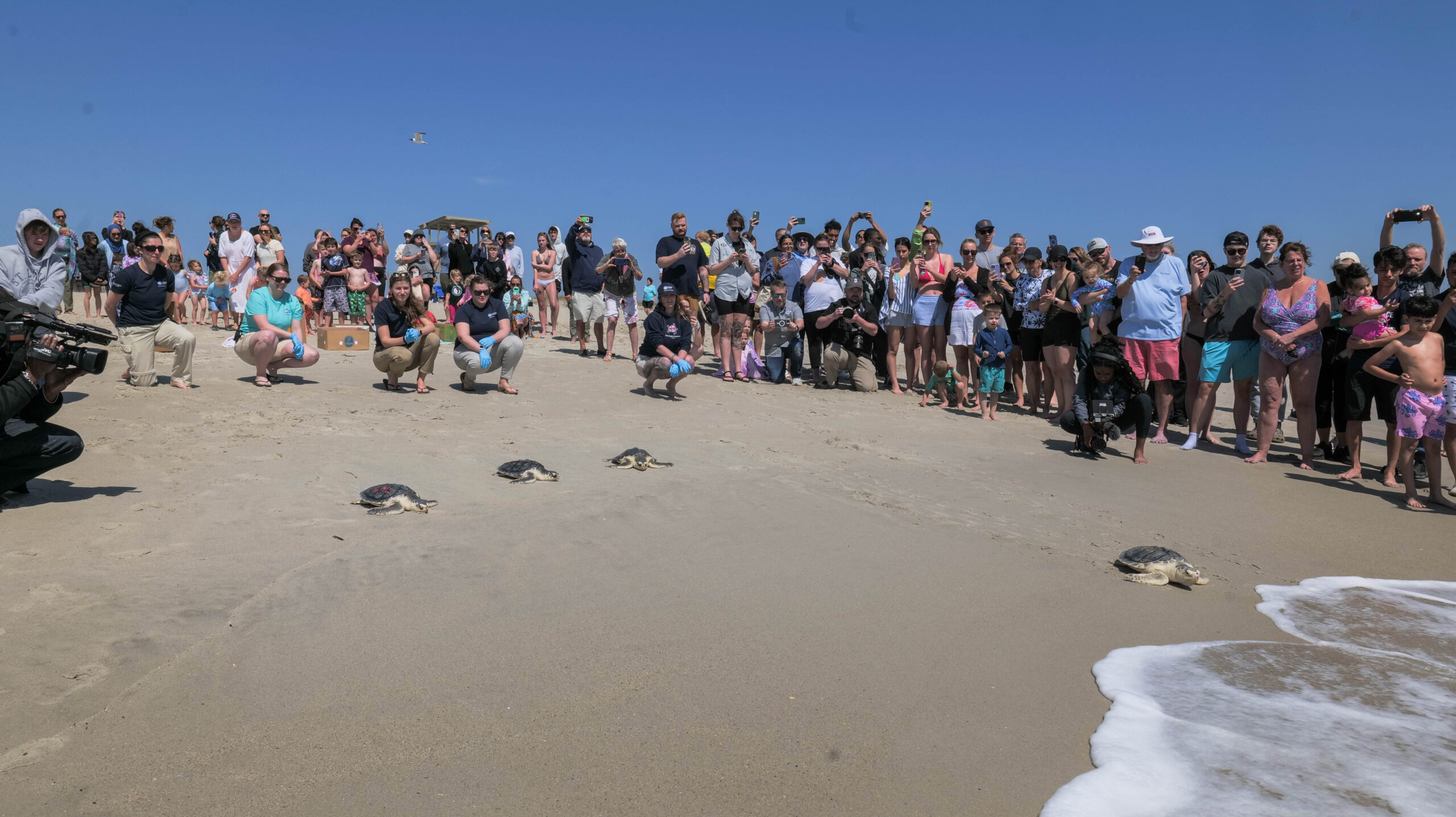
FORT FISHER, N.C. (April 14, 2025) – After months undergoing rehabilitative care, 31 critically endangered sea turtles are now back in the Atlantic Ocean.
**PHOTOS AND VIDEO AVAILABLE HERE WITH CREDIT TO NEW ENGLAND AQUARIUM**
Biologists from the New England Aquarium drove the 25 Kemp’s ridley sea turtles from the Aquarium’s Sea Turtle Hospital in Quincy, Mass., and another six Kemp’s ridleys from New York Marine Rescue Center (NYMRC) in Riverhead, N.Y., down to Fort Fisher, N.C., where they were released Monday as a small crowd of bystanders looked on from the beach. The turtles spent four to five months undergoing treatment for conditions including pneumonia and dehydration after becoming cold-stunned in November and December; the Aquarium’s turtles stranded on Cape Cod beaches and NYMRC’s turtles stranded on Long Island. After veterinarians recently cleared the group of sea turtles to return to the ocean, the Aquarium organized a ground transport to North Carolina where the waters are now warm enough for the animals to reacclimate.
“It is always incredible to watch these turtles become healthy again after being cold-stunned. The progress they make from when they first arrive at the New England Aquarium all the way to when they are released on the beach is amazing and really proves how resilient these animals are,” said Sammi Chaves, a Rescue Biologist at the New England Aquarium who led the transport.
During ground transports, the vehicle temperature is set to match the water temperature at the release location and monitored throughout the trip. The turtles also receive fluids to better prepare them for a return to the ocean.
The group of rehabilitated turtles from the Aquarium included “Pegasus,” known among staffers for its graceful swimming, and “Linus,” a small turtle with a big appetite. Aquarium staff, volunteers, and interns have a tradition of naming the turtles receiving months-long care. This year’s theme was Greek mythology, with “Medusa,” “Apollo,” and “Echo” also among the group of released turtles.
Another notable turtle, “Violet”—who originally stranded in 2023, underwent rehabilitative care at the Aquarium, and was released in August of 2024—restranded in November 2024. Violet seemed strong despite needing treatment for wounds on her face, and Aquarium staff released her again on Monday with an acoustic tag affixed to her shell, which will provide essential location data to better understand Kemp’s ridley migration patterns and habitat use.
“With sea turtle strandings on the rise over the past decade, our rescue, rehabilitation, and research efforts are more important than ever. We have much to learn about these animals, especially the critically endangered Kemp’s ridley, if we are to ensure a viable future for them,” said Adam Kennedy, the Aquarium’s Director of Rescue and Rehabilitation.
This past cold-stunning season, which began in November 2024 and went into January 2025, more than 500 live turtles came through the Aquarium’s doors. Rapidly changing ocean temperature and wind patterns cause many turtles to become hypothermic and strand on the shores of Cape Cod Bay. Staff and volunteers from Mass Audubon’s Wellfleet Bay Wildlife Sanctuary walk the beaches and rescue the animals, transporting them to the Aquarium’s Sea Turtle Hospital to be triaged and rehabilitated.
Rescued sea turtles may require weeks or months of care depending on the severity of their illnesses and injuries. The remaining 42 turtles at the Aquarium facility will be released off Cape Cod in the summer months, once the waters of Nantucket Sound have warmed.
MEDIA CONTACT: Pam Bechtold Snyder—617-686-5068; psnyder@neaq.org
